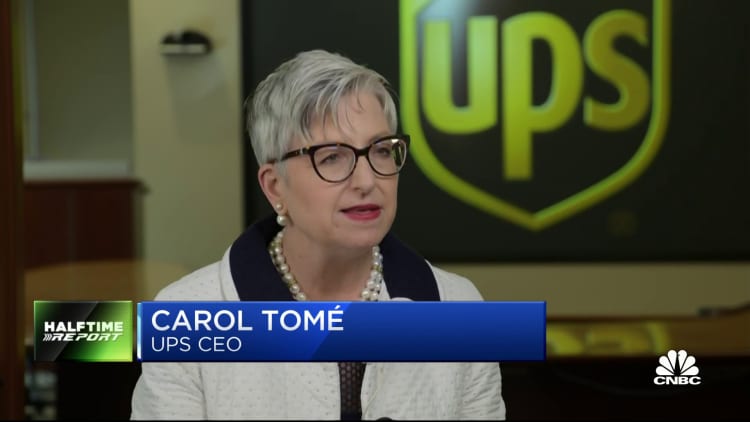
United Parcel Service shares fell Tuesday after the American trucking and delivery giant reported first-quarter misses on both earnings and revenue.
To some analysts, the relatively weak report from UPS hints at a wider economic slowdown, particularly when coupled with CEO Carol Tomé's comments.
"In the first quarter, deceleration in U.S. retail sales resulted in lower volume than we anticipated, and we faced ongoing demand weakness in Asia," Tomé said in a statement. "Given current macro conditions, we expect volume to remain under pressure."
Here's how UPS performed in the first quarter compared with what Wall Street anticipated, based on an average of analysts' estimates compiled by Refinitiv:
- Earnings per share: $2.20 adjusted vs $2.21 expected
- Revenue: $22.93 billion vs $23.01 billion expected
For the quarter ended March 31, net income fell to $1.9 billion, or $2.19 per share, from $2.66 billion or $3.03 per share, a year earlier. Revenue fell 6% from the same quarter last year.
Tomé told CNBC on Tuesday that a larger, industry-wide decline in retail sales in the month of March impacted UPS as well.
She noted that a "change in consumer shopping behavior" has led to increased spending on services and categories such as food and dining, rather than the kinds of goods that might be delivered by UPS.
The Atlanta-based company had previously predicted its 2023 profit margin would be tighter following a record profit in 2022. In its first-quarter report, the company said it now expects its full-year earnings to fall within the low end of its initial outlook, citing "challenging macro conditions and changes in consumer behavior."
The company now expects full-year revenue of $97 billion. Previously, UPS projected revenue between $97 billion and $99.4 billion, versus analysts' estimates of $99.98 billion.
In its fourth-quarter earnings call, Chief Financial Officer Brian Newman said the company expected 2023 "to be a bumpy year." The company has seen volume fall in light of cooling demand and formerly said it expects the majority of its profit to arrive in the second half of 2023.
The first-quarter report comes amid a period of high-stakes workforce discussions at UPS.
Contract negotiations between the company and its unionized workforce kicked off earlier this month, marking the largest private collective bargaining agreement in the United States. The Teamsters union involved in the negotiations represents more than 340,000 UPS workers, and the Teamsters have publicly pledged to strike if they're unable to reach a satisfactory contract with UPS.
The current national contract is set to expire on July 31. Tomé previously said that she believes negotiations will conclude before the end of July.
"It would be naïve of us to think there wouldn't be some volume diversion [as a result of negotiations], and there has been, but not much," Tomé told CNBC on Tuesday.
A UPS strike, which hasn't happened in more than 25 years, would significantly derail UPS operations while causing pile-ups for businesses and consumers that rely on its services. The 1997 walkout led to hundreds of millions of dollars in losses for the company. A UPS walkout in 2023 would likely have even an even bigger impact.
UPS and the Teamsters last signed a five-year agreement in 2018. In the years since, the package-delivery industry was majorly altered by the pandemic: A Covid-spurred e-commerce boom fed into a spike in UPS shipping volumes, which the union says worsened working conditions amid high profits for the company.
The Teamsters have said they are looking for higher wages, more manageable shifts and improved safety measures, among other demands.

